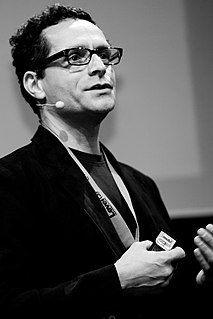A Quote by Steve Jobs
When I was young, there was an amazing publication called The Whole Earth Catalog, which was one of the bibles of my generation. It was created by a fellow named Stewart Brand not far from here in Menlo Park, and he brought it to life with his poetic touch. This was in the late 1960's, before personal computers and desktop publishing, so it was all made with typewriters, scissors, and polaroid cameras. It was sort of like Google in paperback form, 35 years before Google came along: it was idealistic, and overflowing with neat tools and great notions.
Quote Topics
Along
Amazing
Before
Brand
Brought
Came
Cameras
Catalog
Computers
Created
Desktop
Desktop Publishing
Earth
Far
Fellow
Form
Generation
Google
Great
His
Idealistic
Late
Life
Like
Made
My Generation
Named
Neat
Notions
Overflowing
Paperback
Park
Personal
Personal Computers
Poetic
Polaroid
Publication
Publishing
Scissors
Sort
Tools
Touch
Typewriters
Which
Whole
Years
Young
Related Quotes
We know that Google Earth and Google Maps have had a tremendous impact on Google traffic, users, brand, adoption, and advertisers. We also know Google News, for example, which we don't monetize, has had a tremendous impact on searches and on query quality. We know those people search more. Because we've measured it.
Google Now is one of those products that to many users doesn't seem like a product at all. It is instead the experience one has when you use the Google Search application on your Android or iPhone device (it's consistently a top free app on the iTunes charts). You probably know it as Google search, but it's far, far more than that.
I remember at the time - right before we started Feministing.com - doing a Google search for the term "young feminism" and the term "young feminist," and the first thing that came up was a page from the National Organization for Women that was about 10 or 15 years old. And it just struck me as so odd that there was all of this young feminist activism going on, but that it wasn't necessarily being represented online, that the first things in a Google search to come up were really, really old. I think to a certain degree we really filled a gap, and that's why we got such a large readership.
What's the worst, is when people clearly haven't researched you. One time an interviewer asked me if I do a lot of plays. I'm like, yeah. Have you Googled me? There's this thing called Google, and you can ask Google that question. Then you could come to me with informed questions that didn't make me feel like I am brand new to the world.
You look to Google, you see this incredible world of information, you see the advertising, but you also get Google Analytics. And Google Analytics coupled with Salesforce's sales and service and marketing means that both of our customers are going to have customer insights that they've never had before. That is really exciting.




































